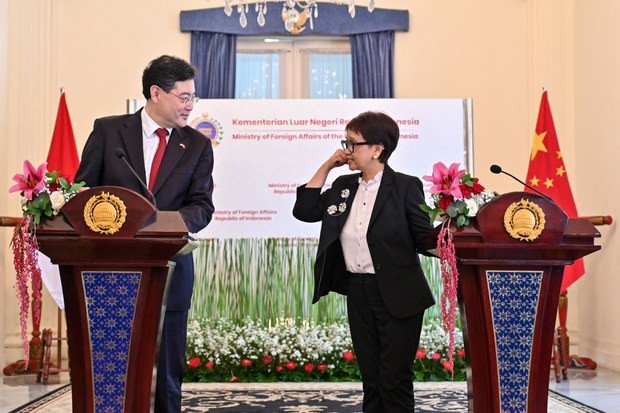February 28, 2023
JAKARTA – Recently, Chinese Foreign Minister Qin Gang went to Indonesia for a state visit. This was his first outbound visit after Cambodian Prime Minister Hun Sen’s China visit amid Chinese New Year. This is also Qin’s first visit to a neighboring country after he took his new post as foreign minister. So clearly, the strategic significance of Indonesia in China’s neighbor diplomacy has sharply increased.
During the visit, Qin met with President Joko “Jokowi” Widodo and the coordinator for cooperation with China and Coordinating Maritime Affairs and Investment Minister Luhut Binsar Pandjaitan, respectively.
Qin jointly hosted and chaired the fourth meeting of the Joint Commission on Bilateral Cooperation (JCBC) between China and Indonesia with his counterpart. He also visited the ASEAN Secretariat and met with the secretary-general. After the meeting, a joint declaration was released by both sides, in which bilateral and multilateral cooperation are highly stressed.
Therefore, it can be concluded Qin’s visit to Indonesia not only focuses on consolidating bilateral relations between China and Indonesia, but also aims to upgrade China-ASEAN relations to a higher level.
At the bilateral level, this year marks the 10th anniversary of the establishment of the China-Indonesia comprehensive strategic partnership. The two sides need to plan ahead for the next 10 years so as to expand and deepen bilateral cooperation. In practice, the new diplomatic team led by Wang Yi and Qin Gang needs to push forward China-ASEAN relations amid intense China-United States strategic competition in the Asia-Pacific region, in which Indonesia has become a major “breakthrough” for China’s new round of “diplomatic offensives” in Southeast Asia.
Additionally, there will be some uncertainties in Indonesia’s foreign policy after the presidential elections next year. Hence, China hopes to engage with the top officials of Indonesia and plan for the next decade of bilateral relations, so as to reduce the negative impact of political changes on bilateral ties.
Qin’s meeting with Luhut demonstrated that both sides want to promote Belt and Road Initiative (BRI) cooperation and thus to lay a solid economic foundation for a stable bilateral relationship. In recent years, China and Indonesia made remarkable progress in BRI cooperation, especially the successful trial operation of the Jakarta-Bandung High Speed Railway.
Actually, in the process of publicizing BRI infrastructure construction achievements, China listed the Jakarta-Bandung High Speed Railway and the China-Laos Railway as two landmark BRI projects in Southeast Asia.
Given the considerable political turmoil that Myanmar has experienced over the past few years, the ambitious expectations for BRI cooperation between China and Myanmar, with the China-Myanmar Economic Corridor in particular, have to be reduced, whereas cooperation under BRI between China and Indonesia is expected to accelerate in the near future.
During the pandemic, China took the lead in cooperating with Indonesia in vaccine research and development, and supported Indonesia in establishing a regional vaccine-production center in Southeast Asia. Indonesia is the first country to approve the use of Chinese mRNA vaccines in Southeast Asia. Through close anti-pandemic cooperation, Indonesia quickly became China’s primary partner in anti-epidemic cooperation in Southeast Asia, as well as in construction of the Health Silk Road in the world.
Chinese scholars believe anti-pandemic and public health cooperation between China and Indonesia can add some new impetus to build a common community with a shared future between the two countries.
More importantly, China expects to speed up the building of a community with a shared future with ASEAN via the successful construction of a China-Indonesia community with a shared future.
From a multilateral perspective, this year marks the 10th anniversary of China’s proposition of a common community with a shared future for China and ASEAN, as well as the 20th anniversary of China’s accession to the Treaty of Amity and Cooperation in Southeast Asia (TAC). As the rotating chair of ASEAN this year, Indonesia has become a top priority in China’s multilateral diplomacy toward Southeast Asia. As Chinese Foreign Ministry spokesperson Wang Wenbin pointed out, China looks forward to advancing the building of a peaceful, safe and secure, prosperous, beautiful and amicable home through FM Qin’s visit to Indonesia, as well as deepening China-ASEAN comprehensive strategic partnership.
On one hand, Indonesia identified ASEAN Matters: Epicentrum of Growth as the theme of ASEAN this year. China is a primary and indispensable partner of ASEAN in promoting economic recovery and economic growth after the pandemic. Robust China-Indonesia economic cooperation can help Indonesia and ASEAN to achieve this goal.
On the other hand, ASEAN economic growth is affected by geopolitical competition in the region, especially the intense South China Sea (SCS) dispute. Since Indonesia offered to accelerate the consultation on the Code of Conduct (COC) in the SCS, China is looking forward to achieving more consensus with Indonesia during/after Qin’s visit, so as to conclude the COC consultation as early as possible and thus to maintain peace and stability in the SCS.
***
The writer is director of Research Centre for Asian Studies (RCAS), China.
